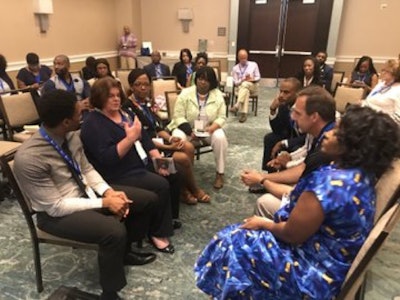FORT LAUDERDALE—If you ask Spelman College student Genesis Thigpen about some of the pressing challenges that face historically Black colleges and universities, retention is at the top of her list.
“I think students have to understand how important it is to stick it out and get the degree,” says Thigpen, a rising junior from Jackson, Miss., who is majoring in economics. “Going to an HBCU can be a difficult thing, especially if someone doesn’t have the money to stay in school. It can be very easy for someone to just drop out.”
 HBCU educators discuss their challenges and provide solutions.
HBCU educators discuss their challenges and provide solutions.Thigpen, a summer intern at the United Negro College Fund’s Atlanta office, had a captive audience of HBCU presidents from 37 of the UNCF member schools who gathered here for three days to share best practices and to train a spotlight on the use of data in their decision-making processes.
The 3rd annual UNCF Career Pathways Initiative Convening & Data Institute brought together HBCU leaders to strategize about the 21st-century workforce, large-scale change and how to prepare students for a rapidly changing, technology-driven world.
The theme of this year’s conference was “Purposeful Disruption” and included breakout sessions focused on how institutions are integrating strategies to improve student success and career outcomes. There were also opportunities for institution leaders to discuss how they made mistakes, failed, and were able to rebound.
“We need to have more opportunities to talk to each other,” says Laverne Maon-Jamison, assistant director of Institutional Effectiveness and Research at Livingstone College, a small, private, historically Black college in Salisbury, N.C. “Sometimes HBCUs get a bad rap, but we don’t do a good job at always telling our story. We are accepting students into college and giving them a chance to succeed.”
Promoting collaboration across institutions was the point of the convening, which was sponsored by the Lilly Endowment, Inc. Other goals included finding ways for institutions to effectively use technology on their campuses and developing skills on how to best execute data-analysis projects.
“Everybody should be data-literate,” said Dr. Amelia Parnell, vice president for Research and Policy at the National Association of Student Personnel Administrators (NASPA), “We have to have evidence.”
Parnell said institutions should ask the following questions:
- Are students leaving college prepared for the next phase of life?
- Is an institution’s reputation brand strong?
- Can a college grow and sustain its business model over the next 10 years?
Dr. Terrell L. Strayhorn, the interim vice president for academic and student affairs at LeMoyne-Owen College in Memphis, kicked off the convening with a keynote address in which he said educators must see career and college readiness as social justice work.
“We have to reimagine how we deliver education,” said Strayhorn, who noted that 40 million people are currently working in jobs that did not exist just five years ago. “Educators have to be nearly prophetic in thinking about jobs that don’t exist now.”
Edward Smith-Lewis, director of the UNCF Career Pathways Initiative, said that the work of the initiative is “crucial to low-income and first-generation college students,” and that participants arrive with a desire to help “move the agenda for the betterment of students that we serve.”
Because UNCF officials combined the Careers Pathways Initiative with the Data Institute this year, it hit record numbers in the overall attendance, said Dr. Michael Lomax, president and CEO of UNCF.
“I have a vision for us having a larger and more substantive gathering which enables more of the constituency from within the institution to come together around substance and to build more community,” said Lomax. “It’s not just presidents talking to presidents, provosts talking to provosts, CFO’s talking to CFO’s, it’s all the above and they’re beginning to cross-pollinate.”
Lomax said that when institution leaders get together, there are innovative opportunities where they are learning from each other and can exchange ideas, including meeting talent from other institutions.
“We do see people moving back and forth across these institutions,” he said, adding that for new college presidents, the convening provided them with an opportunity to meet and network with longtime veterans.
The focus, he said, is on the students like Thigpen.
“We are transforming education and career opportunities for those excluded in the past,” Lomax told the more than 300 participants at the opening session. “The solutions we are seeking is in this room.”
Jamal Watson can be reached at jwatson1@diverseeducation. You can follow him on Twitter @jamalericwatson



















